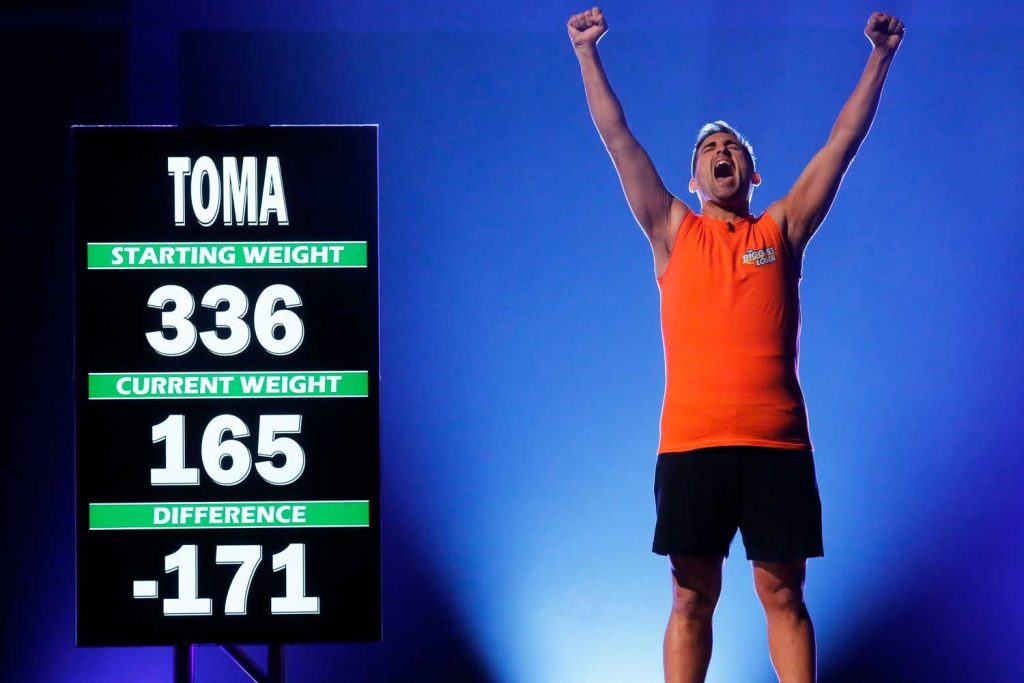:max_bytes(150000):strip_icc():format(jpeg)/THE-BIGGEST-LOSER-Live-Finale-Toma-Dobrosavljevic-082625-c1bca06ed0c64dd68b7517f27a22fb8f.jpg)
NEED TO KNOW
- The Biggest Loser aired from 2004 to 2020
- NBC never officially canceled the series, but production stopped in 2016 after allegations of drug use and unhealthy weight loss methods surfaced
- The series briefly returned in 2020, but only for one season
The Biggest Loser promised life-changing transformations. But instead, it became a cautionary tale about the dangers of rapid weight loss.
Premiering in 2004, the controversial NBC reality series challenged a group of overweight contestants to see who could drop the most pounds in 30 weeks. The winner was not only crowned “the Biggest Loser” but also took home a grand prize of $250,000.
At its peak, the show drew millions of viewers and turned trainers like Jillian Michaels and Bob Harper into household names. Yet as ratings climbed, so did criticism with former contestants, health experts and even law enforcement questioning the show’s grueling methods.
By 2016, the backlash had reached a breaking point, and NBC quietly stopped producing the series, per KQED.
The network revived The Biggest Loser after a four-year hiatus and aired it on the USA Network in 2020. However, the series was not renewed for a 19th season.
So, why did The Biggest Loser end? Here’s everything to know about the multiple controversies that took the reality competition series off the air.
The season 15 winner’s weight loss was controversial
Trae Patton/NBCU Photo Bank/NBCUniversal via Getty
In 2014, Rachel Frederickson won season 15 of The Biggest Loser by dropping 155 lbs. When she stepped on the scale and revealed that she weighed 105 lbs., Harper said he and Michaels were alarmed by how she looked.
“Rachel came out, and she had lost so much weight, it was … shocking,” the celebrity trainer told Netflix’s 2025 documentary Fit for TV: The Reality of The Biggest Loser. “Jillian and I were just in horror.”
Fredrickerson’s transformation drew widespread attention and concern from fans who felt she appeared underweight. In a December 2014 essay for Today, she wrote that she “had never felt stronger” during the live finale and “was extremely proud” of herself.
Contestants urged cancellation after an alarming health study
Dave Bjerke/NBCU Photo Bank
A study published in 2016 found that the rapid weight loss The Biggest Loser contestants underwent actually damaged their metabolism. After checking with 14 people from season 8 six years after the finale, researchers determined that 13 of them had regained the weight they lost and some had even gained more.
After the study was published in The New York Times, former contestants called for the show’s cancellation in the New York Post. Season 2’s Suzanne Mendonca said that The Biggest Loser “needs to be done, canceled, destroyed,” while season 3’s Kai Hibbard stated that it “should’ve been canceled 10 years ago.”
In a statement to Fortune, the show’s producers described the study as “interesting for everyone who struggles to lose weight and maintain weight loss” and claimed that there were “many former contestants” who maintained their weight after the show.
Police investigated drug claims
Courtesy of Netflix
Around the same time the alarming study was published, season 7 contestant Joelle Gwynn accused the show’s trainers of supplying her with illicit weight loss drugs. Though producers denied the allegations — saying in a statement to Fortune that there is “zero tolerance” for illegal substances — the Los Angeles County Sheriff did investigate the claims.
Producers from the show told PEOPLE at the time that the allegations are “without merit and false.”
Dr. Robert Huizenga filed a defamation lawsuit against Gwynn and the New York Post for publishing her drug allegations, but it was later dropped. According to The Hollywood Reporter, NBC launched an internal investigation into the accusations in 2018.
Jillian Michaels came under fire for giving her team caffeine pills
Trae Patton/NBCU Photo Bank/NBCUniversal via Getty
During season 15 of The Biggest Loser in 2013, Michaels admitted during one episode that she had been giving caffeine pills to her team and was given a “four-pound disadvantage” that week.
In Fit for TV, which Michaels did not participate in, Huizenga said that the trainer often ignored his medical advice, a claim that she fought back against after the documentary aired. She refuted allegations that the medical advisor did not approve of the supplements.
In an August 2025 Instagram post, Michaels shared a screenshot of multiple emails dated back to 2009 that appear to show conversations between the trainers and producers about the use of the pills.
“This is one email of many that shows: Dr. Huizenga did approve caffeine pills on many seasons of Biggest Loser,” she wrote in the caption. “Caffeine was NEVER banned on The Biggest Loser.”
NBC stopped producing the show amid backlash
John Britt/USA Network/NBCU Photo Bank via Getty
NBC never officially canceled The Biggest Loser. After the 17th season wrapped up in 2016, the series went on a four-year hiatus following the drug allegations and Huizenga’s lawsuit.
In 2020, NBC aired the 18th season of The Biggest Loser on the USA Network, making a few changes that Harper told PEOPLE in 2019 were “not about getting skinny” but “about getting healthy.” Some of those shifts included getting rid of “temptation challenges” and giving every contestant, win or lose, a free membership to Planet Fitness, access to a nutritionist and a local support group.
However, the lowered $100,000 prize still went to the person who lost the most. After Jim DiBattista won the title in 2020, NBC has not brought The Biggest Loser back for another season.

